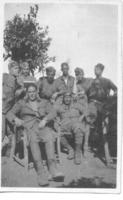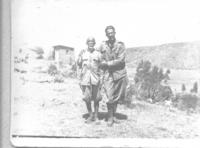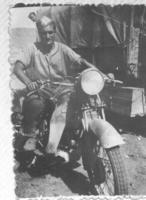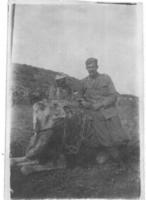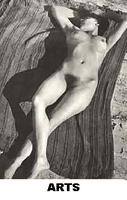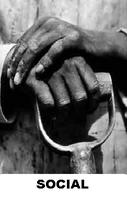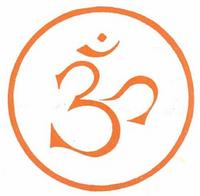
I have summarised below some
yoga principles I have been learning for direct experience and on which I have been working for two solid years. I have never read a yoga book from cover to cover. So, all my experience comes essentially from the practice, the interaction with my teachers and my personal reflections. I would like of course also to deepen my knowledge in a more scientific way and to become a bit more academic, so watch the art space for reviews of three books ready on my bed side table for reading. Notwithstanding, I think it is important to get into the real practice in the most uncontaminated and even naive way to gradually discover it and all its benefits.
Some principles:
Fear shortens the breath. Thus, every time you experience sensations of fear bring your attention back to your breath.
Be present.
Strength and flexibility are only side effects of the yoga practice.
Be Calm and peaceful.
Let it go.
Go through the sorrow and pain processes, which are part of life.
Accept and observe your body and mind without judging your performance.
Always Relax the face: relax tongue and eyebrows.
Uddyana bhanda* and mulabhanda** -- abdominal locks. Core centre (spleen chakra and root chakra) of our body allowing us to be balanced and source of our lightness and energy.
Enter every pose (asana) in a gradual way elongating your spine and working from the roots (hips and shoulders). Try to keep the core centre working.
Namaste means *Buddha in you*, and it closes every practice as a form of thanksgiving.
OHM chanting. *Ohm* is the most basic sound of all sounds. It is a vibration starting from the diaphragm, up to the vocal chords and coming out of the mouth. It is a release with control and usually performed at the beginning and end of the yoga practice.
Pranayama:
Filling the bottle -- inhale from the nostrils -- movement from the bottom up.
Empty the bottle -- exhale from the nostrils -- movement from the top to the bottom.
Ujjay breath -- breathing with the back of the throat through the mouth, but with this latter shut. It allows an expansion of lungs, controls the intake of air and produces a sea sound helping the concentration.
Chanting of a mantra -- repetition of a chorus over and over again unitl positive energies develop and meditation starts naturally.
The single act of singing itself allows us to "give voice" to our heart. Within and through singing, we open the path from the heart to the voice, finding easier to express our feelings. When we add the power of mantra to the act of singing we have a very potent tool for opening the heart chakra, and calming the mind and body. As we reapeat the mantras, we invoke sacred energies that draw us beyond the chatter of the mind and into a silent, powerful space. Chanting in a group creates even more power as the vibrations of the music and other chanters penetrate our body and mind to uplift us and break down the illusions of inner and outer, one and other, uniting us into that stillness that is at the heart of reality.
Meditation -- to meditate means "eliminate any conflict inwardly and therefore ourwardly", "stilling the thought-waves of the mind" [Patanjali]. Get into a comfortable position (lotus position if this is comfortable for you) where your back is straight and your chakras are aligned. Set your shoulders to where they belong: the back, creating space and gently elongating the neck towards the sky. Close the eyes, or better narrow them staring at your nose (and eventually looking inside you), start observing your breath and keep breathing until your concentration focuses entirely on this flow of air, in and out your nostrils, and eventually focuses on your inner self. This is only the premise to start the meditation stage.
*Diaphragm Lock is applied by lifting the diaphragm high up into the thorax while pulling the upper abdominal muscles back towards the spine, creating a cavity, and giving a gentle massage to the heart muscles. It helps to move and transform pranic energy up to the neck region, stimulates the hypothalmic-pituitary-adrenal axis in the brain and develops a sense of compassion. Can give new youthfulness to the entire body. It is normally applied with the breath held out.
** Also known as the Root Lock or Core Lift. This lock increases and holds energy in the first and second chakras, channeling dormant energy from the base of the spine. It contracts the rectum, sexual organs, and navel. To engage Mulabhanda, inhale deeply. As you exhale, contract the muscle about 1 inch below the naval, and two inches into the body.
From http://www.focalpointyoga.com/ask_the_yogini.htm
P.S. At the yoga centre they are starting greeting me with my first name: "hello Silvia", "bye bye Silvia", which I find it so *homey* since it is becoming my second home.

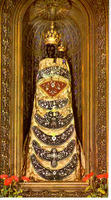 As to his real appearance, the matter is controversial. He was born in Middle East, but the official iconography has always depicted him white and with blue eyes. Last June, my dad and I took my English friends to the Sanctuary of Loreto, where the house believed to be Maria's abitation is conserved. According to the legend, it was brought to that town by the angels. Inside the stone shrine (scientifically proved to be holy house), there is the statue of her, who is sacred and venerated by pilgrims for her long record of miracles. This statue is black: it is a black woman in a gold dress covered in jewelry. I asked my dad the reason, and he told me that, according the tradition, it was white in origin, but became black for the exhalation of all the pilgrims' breath in that constrained space.
As to his real appearance, the matter is controversial. He was born in Middle East, but the official iconography has always depicted him white and with blue eyes. Last June, my dad and I took my English friends to the Sanctuary of Loreto, where the house believed to be Maria's abitation is conserved. According to the legend, it was brought to that town by the angels. Inside the stone shrine (scientifically proved to be holy house), there is the statue of her, who is sacred and venerated by pilgrims for her long record of miracles. This statue is black: it is a black woman in a gold dress covered in jewelry. I asked my dad the reason, and he told me that, according the tradition, it was white in origin, but became black for the exhalation of all the pilgrims' breath in that constrained space.


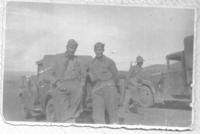 My paternal grand dad participated, as an italian soldier, to the colonial expansion to east Africa organised by Mussolini in 1935. He travelled through the Libyan desert, which I have visited in 2004 (see
My paternal grand dad participated, as an italian soldier, to the colonial expansion to east Africa organised by Mussolini in 1935. He travelled through the Libyan desert, which I have visited in 2004 (see 